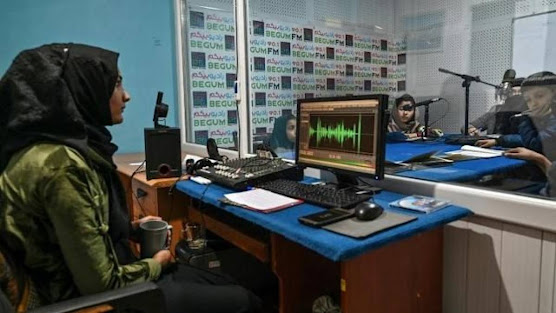KABUL : 'We are not giving up' : '' Radio Begum '' broadcast voices of muted women across Afghanistan.
From Taliban controlled Kabul, Radio Begum is broadcasting the voices of women that have been muted across Afghanistan. Station staff fill the air-waves with programming for women by women : educational shows, book readings and call-in counselling.
For now, they operate with the permission of the hardline groups who regained power in August and have limited the ability for women to work and girls to attend school.
''We are not giving up,'' pledged 48-year-old Hamida Aman, the station's founder, who grew up in Switzerland after har family fled Afghanistan a few years after the Soviet Union invaded.
''We have to show that we don't need to be scared,'' said Aman, who returned after the ousting of the Taliban's first regime in 2001 by US-led foreign forces.
'' We must occupy the public sphere.''
' Vessel for voices'
The station was founded on March 8, International Women's Day, this year, five months before the Taliban marched into Kabul and finalised their defeat of the US-backed government.
From a working- class neighborhood, it continues to broadcast across Kabul and surrounding areas - and live on Facebook. ''Begum'' was a noble title used in South Asia, and it now generally refers to a married Muslim woman.
'' This station is a vessel for women's voices, their pain, their frustrations,'' Aman said.
The Taliban granted permission for the broadcaster to stay on the airwaves in September, albeit with new curbs.
Radio Begum's 10 or so employees used to share an office with male colleagues who worked on a youth radio station.Now, they are separated.
Each sex has its own floor, and a large opaque curtain has been installed in front of the women's office.
Pop music has been replaced with traditional songs and ''quieter music,'' Aman said. Nevertheless, staff members said working at the station was a ''privilege'', with many government workers barred from returning to offices.
The Taliban have yet to formalize many of their policies, leaving gaps in how they are implemented by the groups across the country. Most public secondary schools for girls have been shut down since the take over. But twice a day, the radio studio resembles a classroom.
When AFP visited, six girls and three boys - all aged 13 or 14 - pored over their books as the presenter gave an-air lesson about social justice.
'' Social justice is opposed to extremism,'' said the 19-year old teacher, a student of journalism until a few months ago.
''What is justice in Islam?'' she asked.
Golden opportunity
Mursal, a 13-year-old girl, has been going to the studio to study since the Taliban blocked some secondary schools from reopening.
'' My message to girls who can't go to schools is to listen to our programme carefully, to use this golden chance and opportunity,'' she said.
''They may not have it again.''
There are also on air-lessons for adults. In one such lesson, station director Saba Chaman, 24, said the autobiography of Michelle Obama in Dari. She is particularly proud of a show where listeners call in for psychological counseling.
In 2016, just 18 percent of women in Afghanistan were literate compared with 62pc of men, according to the former education ministry.
''Women who are illiterate are like blind people,'' one woman who cannot read said on the air.
'' When I go to the pharmacy they give me expired medication. If I could read they wouldn't do it.
'' A few months after the Taliban seized power, Aman met with spokesman Zabihullah Mujahid, and told him the radio was ''working to give voice to women''. He was '' very encouraging '' she said.
But the future is uncertain. In September, the country's leading independent TV station Tolo News reported that more than 150 outlets had shut over restrictions and financial troubles.
Radio Begum is no longer taking in advertising revenue.
If no funds received within three months, the voices of these women will disappear from the airwaves of Afghanistan, Chaman said. My only case for hope at the moment is knowing that I'm doing something important in my life to to help Afghan women.''
Earlier, the ultra-conservative Taliban authorities issued a series of ''religious guidelines which, among other things called on Afghanistan's television networks to not broadcast soap operas on dramas featuring women actors.
The directive came from the Ministry for the promotion of. VIRTUE AND PREVENTION OF VICE and was the first of its kind isued to the country's media networks. The new guidelines came despite pledges from the Taliban that they would be more moderate in their exercising of power this time around.
The ministry said the films or shows that were against Islamic or Afghan values could be banned.
This includes any media that depicts the Prophet Mohammed or other revered figures. The guidelines also set out that women journalists appearing on television should wear hijabs.
The depiction of male bodies, including unclothed torsos, was also deemed inappropriate by the ministry.
'' These are not rules but a religious guideline,'' ministry spokesman Halkif Mohajir said.
Another Taliban spokesperson confirmed to Spanish news agency EFE that the guidelines were not obligatory, but rather suggestions to be kept in mind during transmissions.
The Taliban returned to power in August, twenty years after the US-led forces kicked them out.
Their previous stint in power saw them to ban TV and movies as well as most others forms of media. The one permitted media source was the Voice of Sharia radio channel that broadcasted Islamic propaganda.
During the subsequent two decades of relative press freedom, several homegrown TV networks were set up to showing a range of shows including televised singing competitions and imported soap operas from Turkey and India. [AFP]

.png)


0 comments:
Post a Comment
Grace A Comment!